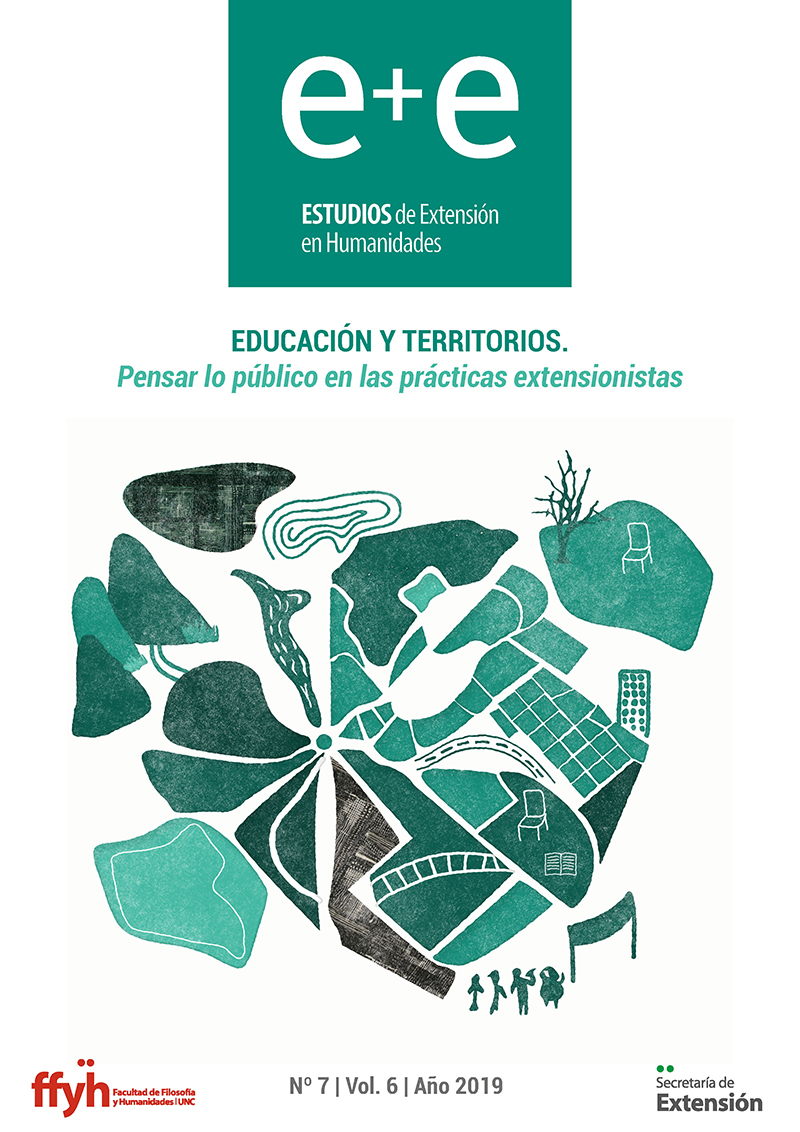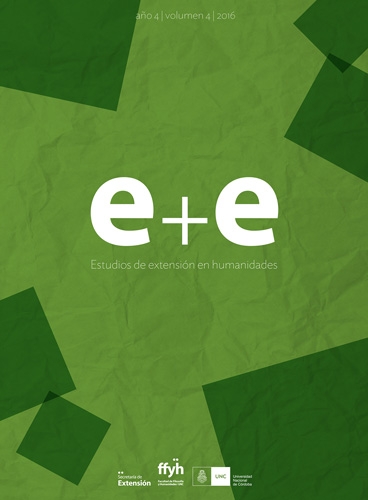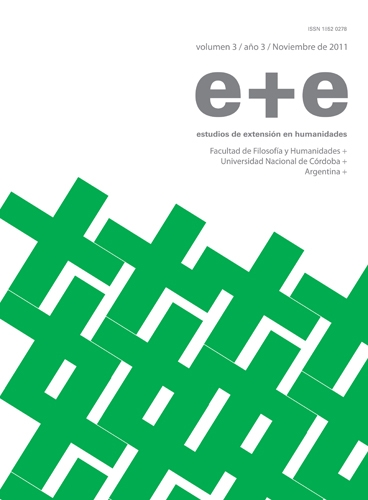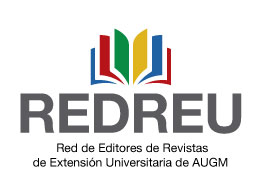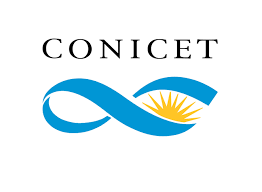Archives
-
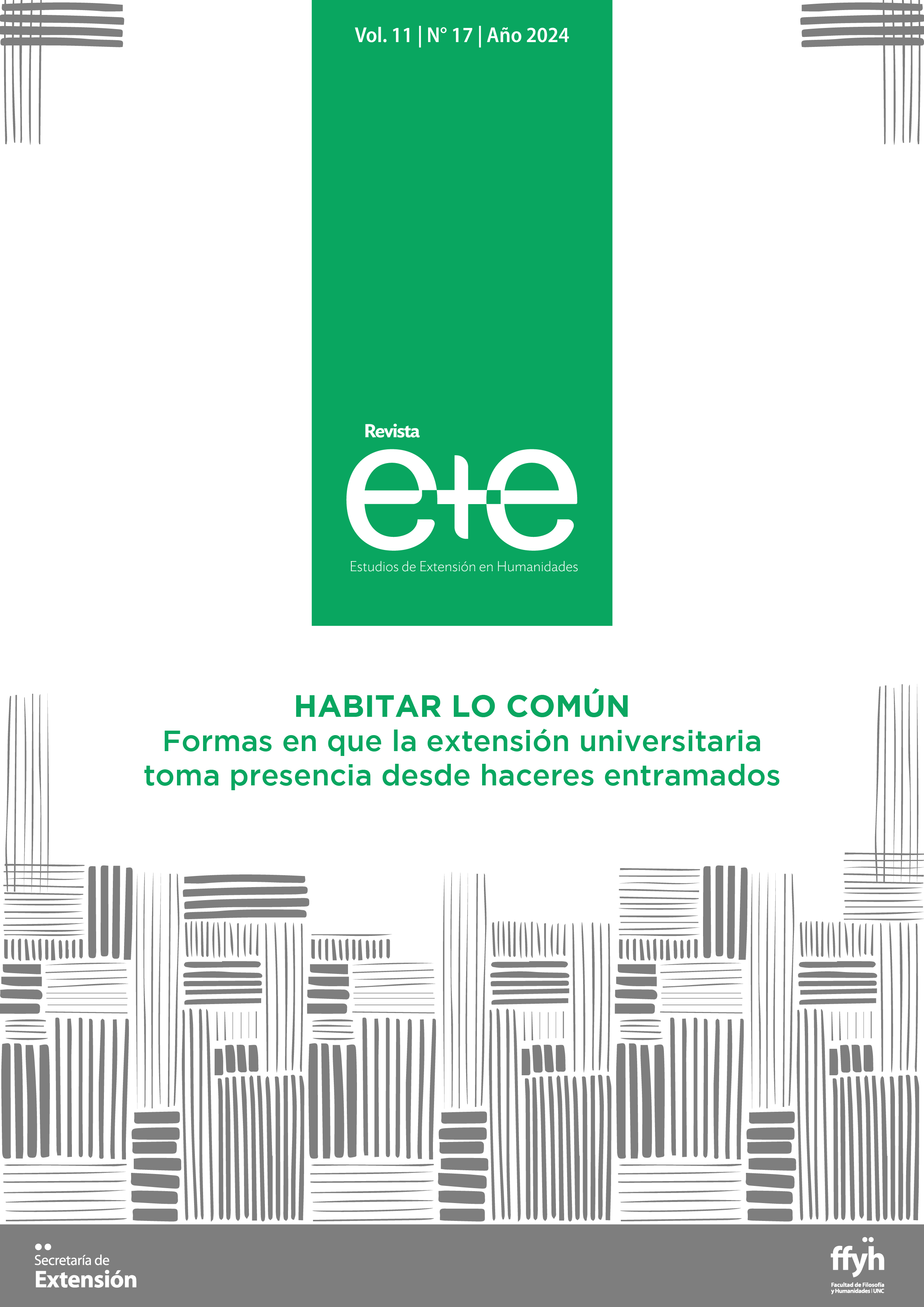
Inhabiting the common. Ways in which the university extension takes presence from interwoven doings
Vol. 11 No. 17 (2024)Making reference to inhabiting and the common opens us to a range of possibilities both in terms of theoretical-methodological perspectives as well as in terms of tasks related to university extension. Combining both in a common inhabiting summons us to also make room for the interweaving of encounters and misunderstandings in the ways of understanding what we conceive as extension and the lines of thought-action from which we weave our positionality together with others. In this line, this dossier invites contributions to the various sections of the journal (articles, audiovisual debates, experience stories, reviews and conversations) that from various narratives point to the way in which inhabiting and the common is defined, co-defined and redefined by diverse collectives - environmentalists, indigenous socio-territorialists, feminists, transfeminists, transfeminists, movements of movements, and others, feminists, transfeminists, LGBTIQA+ movements, peasants, neighborhoods, neighborhoods, among others - from their daily activities, from their encounters and interpellations with various actors, as well as in the encounters and interpellations of the extensionist teams themselves in the articulations, the links that are created and the collaborative work that takes place. We recognize diverse critical traditions that have contributed to the interpretation and production of the common in our contexts (Fanon, Freire, Arguedas, Fals Borda, Zibechi, Esteva, Gutierrez Aguilar, Navarro, Linsalata, Tzul Tzul, among many others). Also thinkers (Lefebvre, Latour, Hobsbawm, Massey, Ingold, Holloway, Fisher, Colquhoun, Fernández-Savater, among others) who, from what they propose, illuminate and make it possible to make crossings, dialogues and articulations between thoughts, practices and imaginations around the common and community. Like Linsalata (2018), we understand that the common is not a thing or a good, but it is a doing, an activity, a political action from which links, solidarity ties, cooperation and a collective doing that allows facing territorial (in)justice, needs, difficulties are generated, creating other ways of inhabiting, of organization, of self-determination, of being and being in the world in constant creation, linking varied and pluriverse spatialities, temporalities and people-collectives that bet on a joint action and, as such, becomes a transformer of the present and a provocateur of other futures. In line with the above, the real spaces that enable encounters and assemblies can acquire a particular place in these descriptions as spheres in which the common is produced and common horizons are created. The relevance of these meetings is given in that they enable different understandings of the excluding geometries of power that we inhabit, recognizing the multiple forms of violence that undermine in many cases the ability of territories and landscapes to sustain life -which is not minor in the present context-; as well as showing the political practices that break into and between these geometries from counter-narratives and counter-cartographies that operate as a political tool in the elaboration of public or common geographies. Thus, to inhabit the common from the way in which the university extension takes presence summons then to share the ways of that joint, collective and collaborative doing, how weaves and weaves are generated in the projects, practices and extensionist actions, in the political and pedagogical forms that germinate, in the situations, affectations and interpellations that happen and in the practices of reciprocity and complementarity that are co-produced in that construction of doings and knowledge with others and from a we.
-
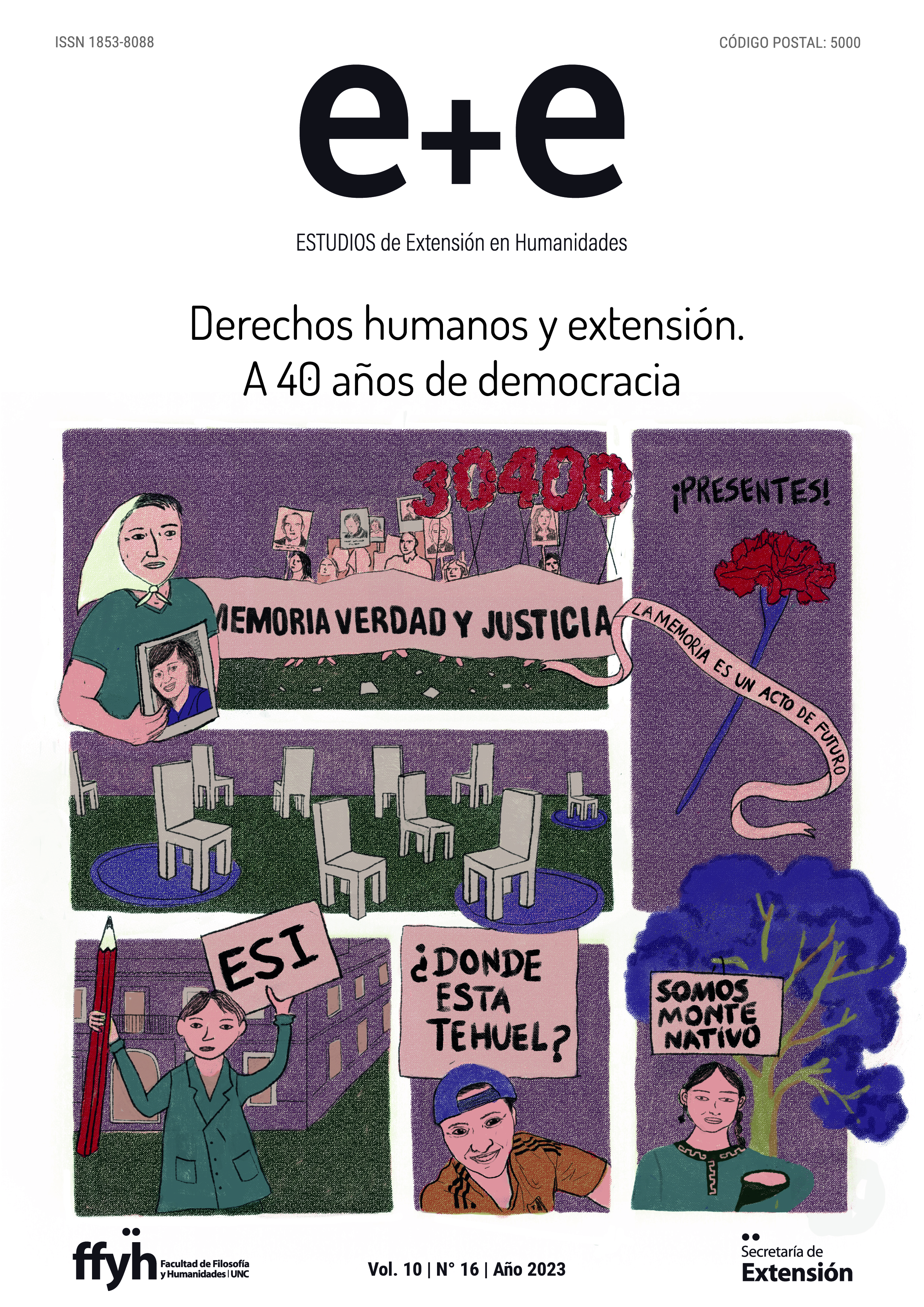
Human rights and extension. 40 years of democracy
Vol. 10 No. 16 (2023)The main objective of this dossier is to interweave different university extension experiences from a human rights perspective, with emphasis on the commemoration of the 40th anniversary of the recovery of democracy in our country. The current political and social context requires rethinking strategies for the effective enforcement of rights, to combat new discourses that threaten the democratic system that cost us so much to conquer and to make visible the importance of collective construction in the realization of a truly inclusive society.
The history of the human rights movement, with its trajectories of struggles, achievements and disputes, shows that rights are not conquered once and forever, that there is no univocal way of naming, categorizing and establishing what is named when we speak of human rights if we do not take into account the genesis and transformation of this idea in a given time and social space. Human rights -as we understand them- are conditioned by the societies in which processes of recognition and violation of rights are developed, as well as spaces of resistance and remnants of humanity in the face of cruelty.From our point of view, it is not enough for individuals to identify that they have rights, or for certain States to recognize the existence of rights; rather, human rights constitute life projects and subjectivities that do not develop in solitude, but are only possible through collective constructions. Hence, human rights have much to do with the politicization of life in common, through the construction of a life with others. That is to say, with subjects with the capacity for agency who delineate the contours of what it means to speak of human rights and what this expression contains or harbors. This process includes both consensus and disputes, advances and expansions, but also regressions.
In this sense, the struggles for the defense and expansion of rights are closely linked to the university commitment, from the political position in which critical extension approaches its university work. Both paradigms are not possible without the constant interlocution with others, with diverse collectives that nurture, stress and discuss the meanings of extension and human rights. Let us consider, for example, how it would be possible for the field of reflection and academic work to make the notion of human rights more complex if it does not take into account the dialogue and links with those who struggle daily in the arena of the (im)possible. In turn, both extension and work with a human rights approach must prioritize times and spaces that go beyond the demands of evaluation systems, that is to say that, in short, they liquefy individual demands.
In this key, we invite you to share extension experiences that work in articulation with the human rights movement; spaces for memory, territorial organizations; popular economy; indigenous communities; peasant communities; environmental organizations; with cis, trans, transvestites, non-binary women and other feminized corporealities, with those who fight for the right to the city; the right to choose, to enjoy. The call is also to interweave reflections with neighborhood educators committed to making effective the right of access and permanence in higher education.
In a context where neoliberalism at a global level is no longer just a political regime or an economic program, but a dominant subjectivity, recovering the emancipatory potential of human rights as a category and political practice from universities in dialogue with other actors and territories is essential, so we redouble the bet with this invitation and encouragement to send your urgent writings. -
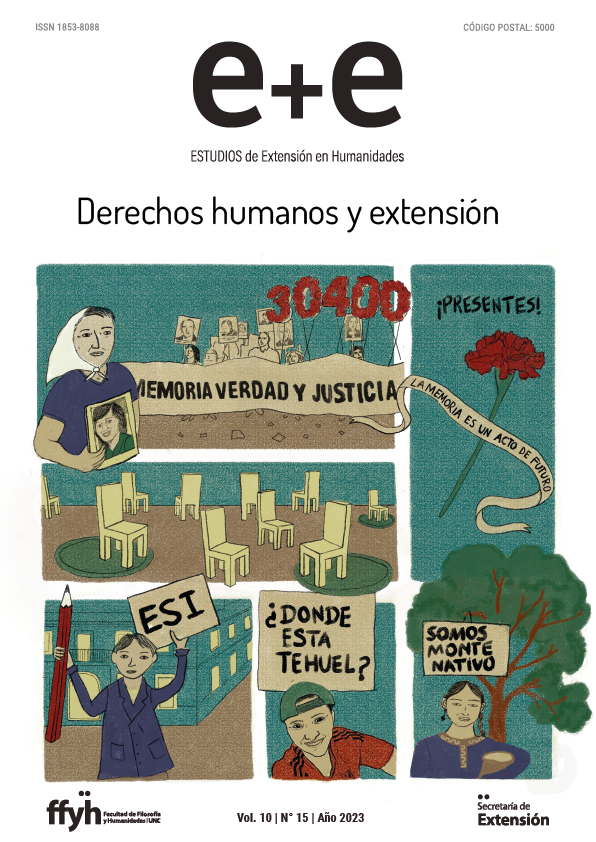
Human rights and outreach
Vol. 10 No. 15 (2023)The main objective of this dossier is to weave together different experiences of university extension from human rights perspectives.
The recent history of our country and the history of the human rights movement with its trajectories of struggles, achievements and disputes, shows that rights are not conquered once and forever, that there is no univocal way of naming, categorizing and establishing what is named when we talk about human rights if we do not take into account the genesis and transformation of this idea in a given time and social space. Human rights -as we understand them- are conditioned by the societies in which processes of recognition and violation of rights are developed, as well as spaces of resistance and remnants of humanity in the face of cruelty.
From our point of view, it is not enough for individuals to identify that they have rights, or for certain States to recognize their existence, but rather, human rights constitute life projects and subjectivities that do not develop in solitude and are only possible through collective constructions. Hence, human rights have much to do with the politicization of life in common, through the construction of a life with others. That is to say, with subjects with the capacity for agency who delineate the contours of what it means to speak of human rights and what this expression contains or harbors. This process includes both consensus and disputes, advances and expansions, but also regressions.
In this sense, the struggles for the defense and expansion of rights are closely linked to university commitment, from the political position in which critical extension approaches its university work. In principle, because of the existence and the commitment of extension work from human rights approaches. But also because both paradigms are not possible without the constant interlocution with others, with diverse collectives that nurture, stress and discuss the meanings of extension and human rights. Let us consider, for example, how it would be possible for the field of reflection and academic work to make the notion of human rights more complex if it does not take into account the dialogue and links with those who struggle daily in the arena of the (im)possible. In turn, both extension and human rights work must prioritize times and spatialities that go beyond the demands of evaluation systems, that is to say, that ultimately liquefy individual demands.
-
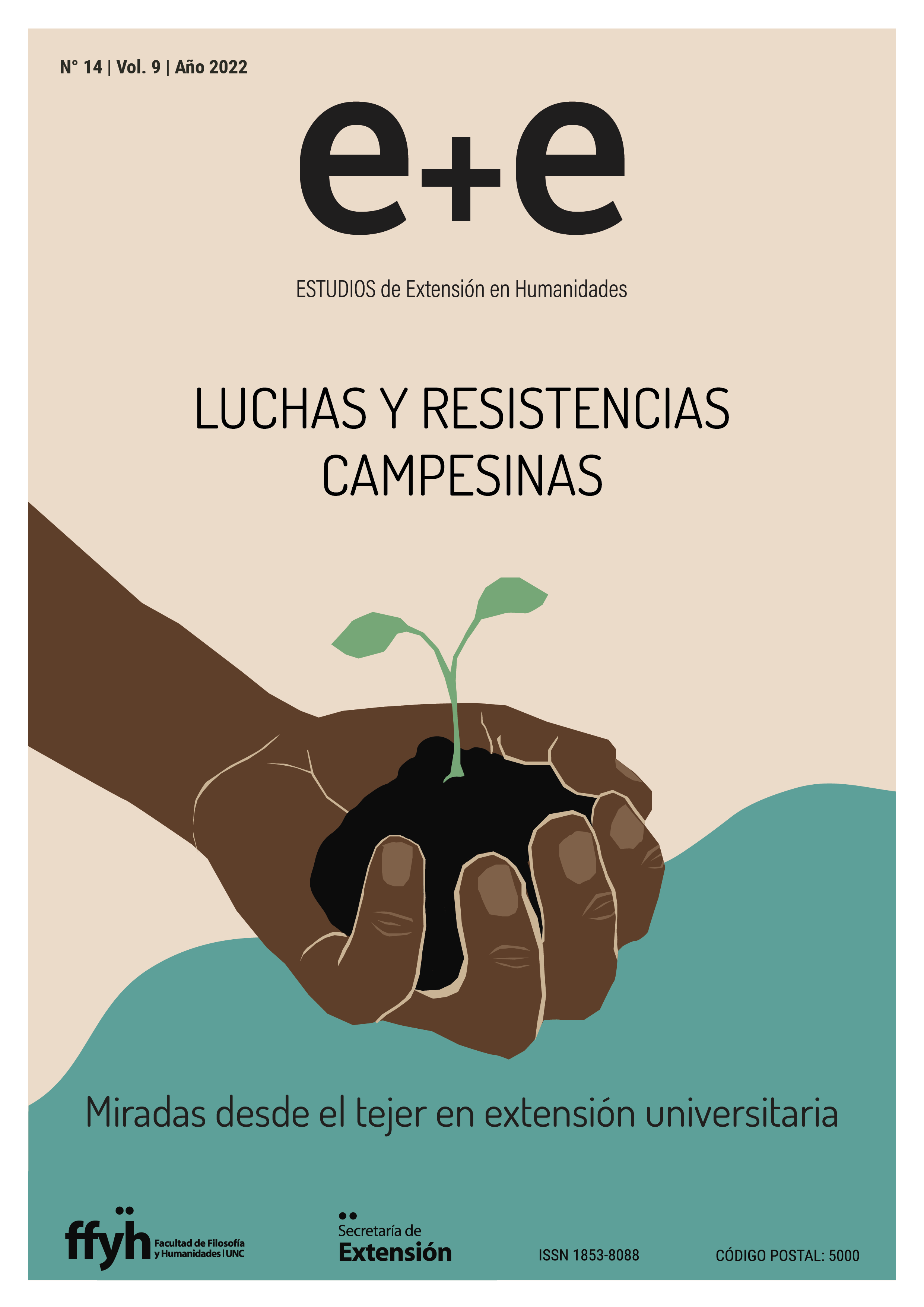
Peasant struggles and resistance: views from weaving in university extension
Vol. 9 No. 14 (2022)Humanity is currently at an unprecedented crossroads. We are witnessing a global environmental crisis that puts life, in all its forms, at serious risk on the immediate horizon.
This scenario calls for urgent responses. Climate change, produced by the predatory and ecocidal action of capitalism, is based on a set of historical social relations in which capital exploits the energies of the planet's resources in a way that
capital depletes the energies of people and nature. Agribusiness, as the hegemonic productive and commercial model imposed by Transnational Agricultural Corporations, is undoubtedly one of the main causes of environmental deterioration, land grabbing and the forced exodus of thousands and thousands of peasant farmers.
This dossier seeks to make visible the long history of peasant struggles and resistances to the compulsion of capital (Bartolomé Bartolomé).
of capital (Bartra: 2006), its multiple and varied territorial experiences, its achievements and challenges.
challenges. The aim is to make visible the diversity, the difference and the concrete ways in which Latin American peasants are facing
Latin American peasants face the expelling pressures of agribusiness. It is a matter of
to understand, listen to and accompany the struggles for the defense of land, the demand for food sovereignty and the self-determination of the
sovereignty and self-determination of the peoples, the unrestricted defense of the environment, the right to identity, to territory, to the
to identity, to territory, the constant and daily struggle against gender asymmetries, among others.
It is essential to highlight the intersectional character of these struggles and the way in which they call upon and challenge the rest of the collectives.
and interpellate the rest of the collectives and organizations of the civil society. For example, when we refer to food
food sovereignty we do not refer only to the right of small producers to produce and feed the population.
to produce and feed the population, but we can also visualize the deep political content of this demand and its enormous potential.
political content of this demand and its enormous potential to address the huge social asymmetries. This is a struggle that challenges us all and that, according to McMichael, implies assuming a peasant point of view that gives back to the people the right to think and organize their food system, taking care of their health, respecting the diversity of cultural practices and avoiding the rupture of the metabolic balance.
To summon and evoke those who create rurality in this obstinate construction of inhabiting territories and are questioning the thinking of the academy to build with others possible civilizing worlds that propose life in a reproductive cycle and care without price, where care and community have their vital space of importance, considering the natural goods, spaces and relationships that are linked from a non-commercial framework.
The construction of the story of a peasant reality where the state builds absences and where its protagonists daily dispute invisible agendas but with irruptive depths. Recovering struggles, projects and dignities is what these territories in struggle call us to today. -
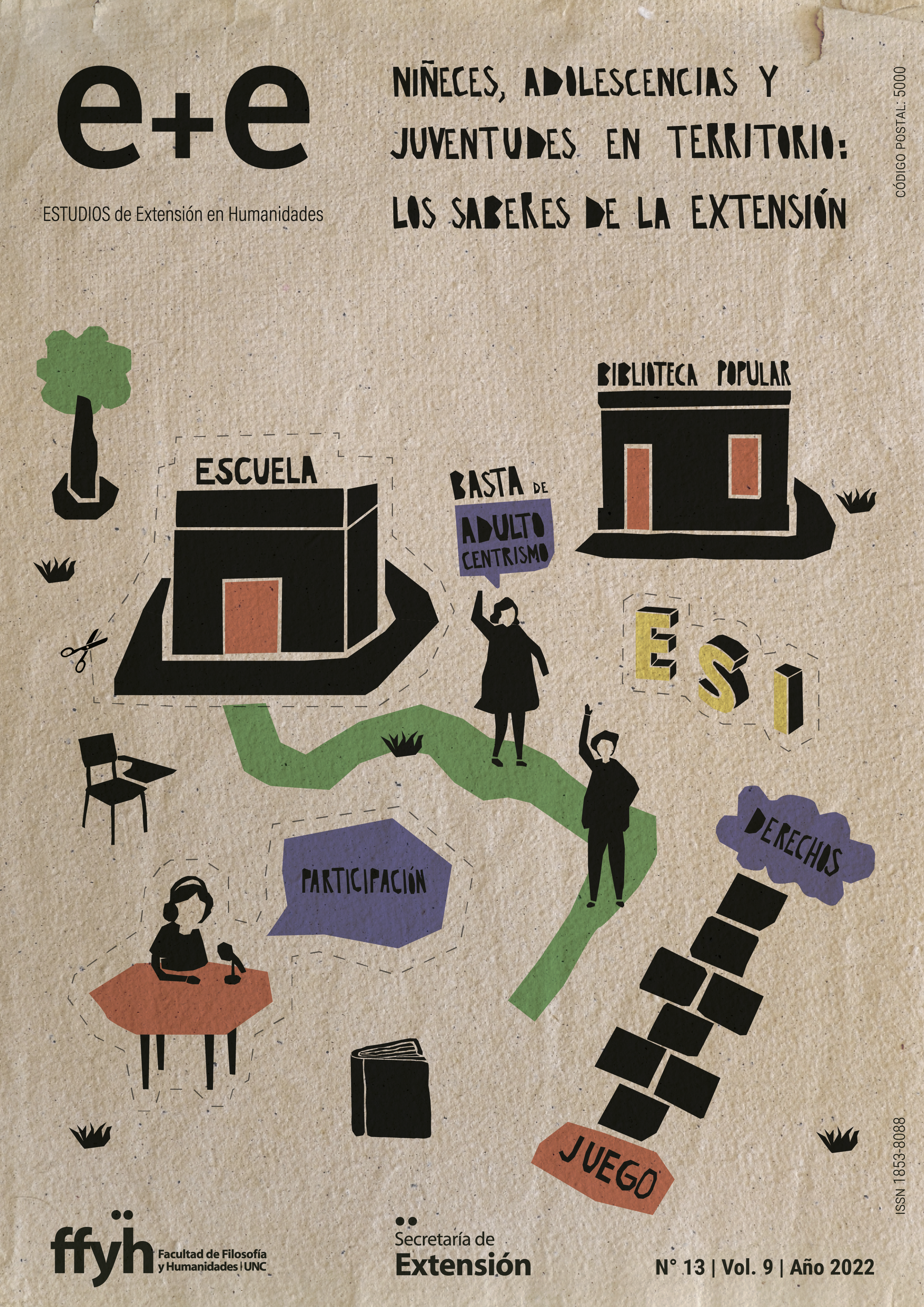
Childhood, adolescence and youth in the territory: the knowledge of extension
Vol. 9 No. 13 (2022)In the field of childhood, adolescence and youth, there are socio-historical disputes between paradigms, practices, policies and rights.
paradigms, practices, policies and rights, where the view of children as minors and objects of protection
appears in conflict with the conception as subjects of rights. These disputes are rooted in adultcentrism, a system of domination that places adulthood as the finished expression of what is human, and is imbricated in the plots of patriarchy and coloniality to produce complex subalternities. The minorization of childhood has gone hand in hand with the subordination of women, and with the imposition of a model of universal childhood, modern and functional to the capitalist system, have generated in our territories unfathomable forms of dispossession. For this reason, working with children, adolescents and young people requires strategies that break down these power relations, restore rights and generate parities. To recognize and make room for their possibilities of creating and transforming, for the powerful ways in which they face difficulties, the beauty with which they draw new horizons and co-protagonize daily life.
The progress in legislation in our country, since the ratification of the International Convention on the Rights of the Child (1994), Law 26061 on the comprehensive protection of the rights of children and adolescents (2005), the Comprehensive Sex Education Law (2006), Law 26206 on National Education (2006), the amendments to the Civil Code (2015), among others, have meant a valuable process in the production of a new plot in intergenerational relations. But these normative changes have not always materialized in practices or public policies capable of impacting the lives of children and young people and their communities, as they have been and continue to be accompanied by a growing and deep inequality and poverty. This scenario invites us to reflect critically on the expansion of rights and their debts in the current situation.
The university, through extension, has generated different links with infancy, childhood, adolescence and youth,
from giving them the place of passive receivers of knowledge, as beings to be completed and modeled in the image and likeness of adults; or as future pieces of the productive apparatus; to the construction of participatory and protagonist experiences, where their voices are the engine of other possible presents. In recent decades, higher education institutions have been, in many cases, relevant actors in the construction of new institutions from a rights-based approach, and in some other cases, those who open doors to narratives of the common good and good living.
The purpose of this dossier is to bring together contributions that account for the diversity of registers, reflections and
experiences, developed in the territories, in dialogues of knowledge with children, adolescents and young people. Practices housed in institutions, schools, organizations and social movements, health centers, neighborhood, cultural and community centers, radios, clubs, trade unions, popular libraries, religious entities, etc. This implies questioning ourselves about other ways of being adults in daily life and in the exercise of our professions, even those that barely glimpse their co-responsibility in the guarantee of rights. We also invite us to ask ourselves about the public and collective place assumed by children, adolescents and young people, the encounter with peers and between generations. Finally, we are interested in the impact of the COVID 19 pandemic on the lives of children, adolescents and young people, especially those who live in poverty, or who, because of their gender, culture, belonging to indigenous peoples, territory or health, suffer from other inequalities.
We hope that this issue of the journal E+E: Estudios de extensión en humanidades can map this variety of experiences, sometimes invisible and minoritized, as well as the subjects it embraces. A map that recognizes in the extension work, the capacities to accompany children, adolescents and youth in the creation of new and more dignified ways of being in this world, of making worlds. -
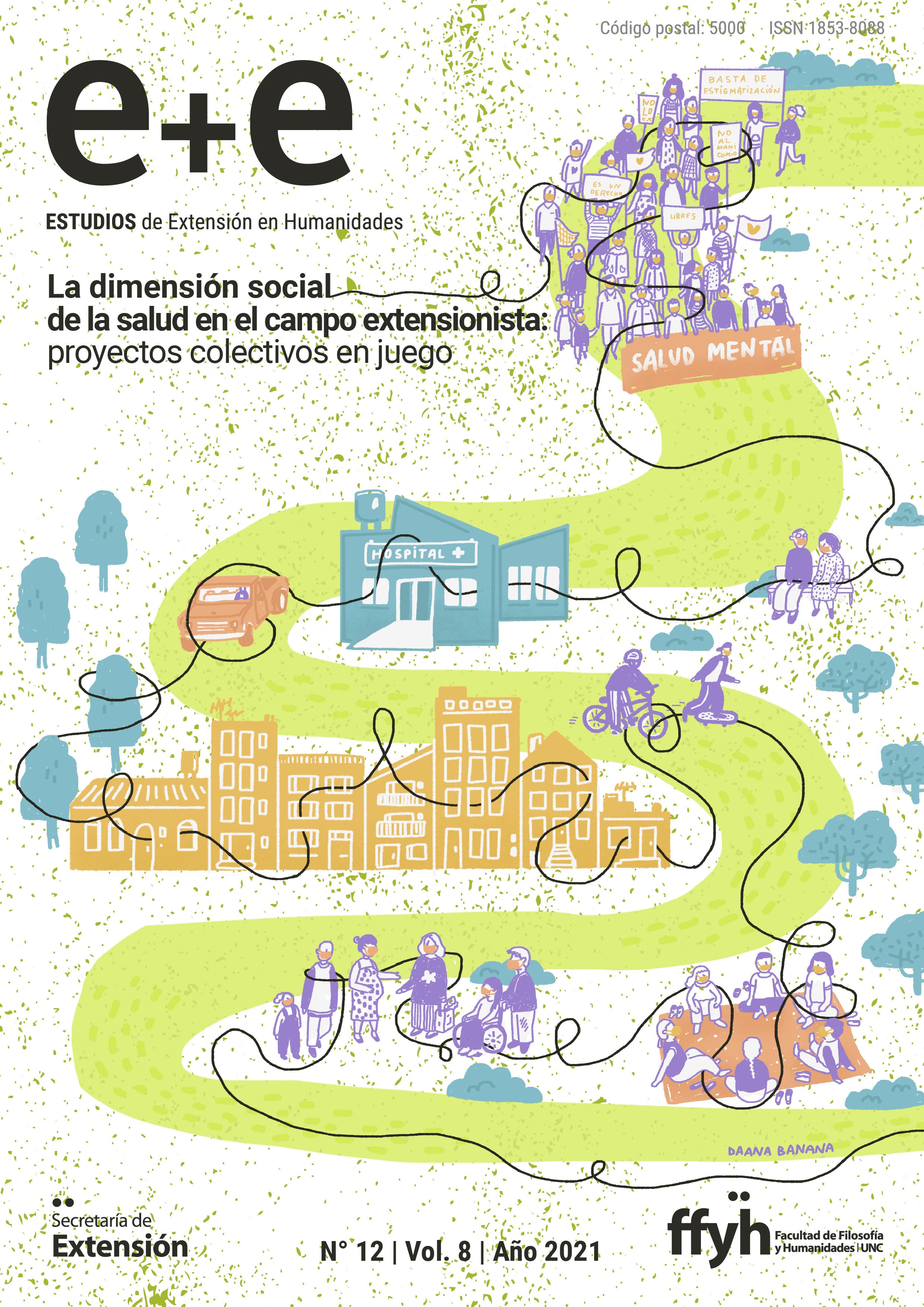
The social dimension of health in the extension field: collective projects at stake
Vol. 8 No. 12 (2021)The socio-health crisis that we are going through and that crosses us on a daily basis, has extended and (re)placed with force numerous questions about what we understand by health, its scope and links with social and territorial inequalities, the environment, the responsibilities that different social actors have and have over it, the complexities involved in care, the limitations of the political answers cut in biological and individual key, as proposed by the market. In the current context, it is necessary to recognize that the pandemic only expands, increases and/or updates these questions and reflections.
We recognize in recent history, that the social dimension of health was brought into focus in our continent at the end of the 20th century by the
continent at the end of the 20th century by the current known as social medicine or collective health. From the academic field, together with social movements, in particular the labor movement, evidence was built on the unequal distribution of disease in our continent at the end of the 20th century.
evidence on the unequal distribution of disease, illnesses and deaths in social groups according to the position they occupied in the structure of society. Foucault's studies (1999, p. 357) point out in this sense that medicine is connected with the economy "no longer simply because it is capable of reproducing the labor force, but because it can directly produce wealth, insofar as health represents a desire for some and a luxury for others". As Laurell (1986) points out, the process of "health-illness" in collective terms, expresses the historical and social character of the human biological process; understanding "the social" not as "external articulation", nor as just another dimension, but emphasizing the "social character in itself". From a subjective perspective, Menéndez argues that "diseases, illnesses, health damages constitute some of the most frequent facts,
recurrent, continuous [...] events that affect the daily life of stratified social groups" (Menéndez, 1994, p. 1).
(Menéndez, 1994, p.71). These are events that disrupt, fragment and disorganize a large part of the social relations of individuals and groups. Together with the irruption of situations of illness or suffering, social responses are organized, also constituting a series of daily, recurrent and permanent constructions, through which relationships, practices (techniques and ideologies) and meanings are established, some of them expressed as professional intervention projects. The field of health is a field of disputes, the tension between societal projects around the expansion of rights and reduction of inequalities against the expansion of the market and the medicalization of life, is expressed in the political, economic, social and also academic game.
The university space and particularly the outreach experiences are configured as a sounding board and at the same time as potential
resonance box and at the same time potential architects in propitiating critical approaches to the dominant, binary and medicalizing modes of social production. It is considered that the projects that bring together multiple experiences and voices are an expression of a context that fosters silenced, repressed, contained demands, which emerge today, with more strength. The extensionist experiences are inserted in historical institutional matrixes and in many opportunities aim at generating instituting processes and novel practices within an instituted habitus, deconstructing meanings and devices crystallized in the most traditional approaches.
traditional approaches. The different feminisms that transversalize university life have contributed to generate ruptures in the health field with normalizing, moralizing and stigmatizing models in the populations, contributing to the design of "new bridges" in propositive approaches. At the same time, several health experiences arise from the heat of organizational and/or community spaces fertile to the encounter with extensionist innovation.
We look at university extension in a broad sense, involved in the most diverse aspects of linkage with society, but from a precise perspective; not as a one-way, unidirectional movement, from a university place with knowledge that "takes" its knowledge to others, lacking such knowledge. Neither do we conceive extension as transferring, preventing, training or communicating in health. Rather, we consider that any extensionist linkage implies an encounter between "knowledges" and "tasks" that can be recognized as distinct and equivalent, as they occur between diverse social actors, between realities that coexist generating situated and contextualized knowledge.
From this perspective, we invite the community in general and the academic community in particular, to share writings that recover practices, experiences, systematizations, reflecting on topics that address health in the extensionist field. For this purpose, we propose some possible axes, although not exclusive, from this social prism that is intertwined with the good living of our peoples:
-Intervention in the framework of the health crisis-Covid 19: the care of health workers,
care demands in vulnerable communities, communicational constructions around risk populations and prevention practices, maps and cartographies of the pandemic from the perspective of extension work, etc.
-The gender and human rights perspective in health approaches: critique of the normalization of bodies;
Visibilization of sex-gender inequalities of workers and users of public services; etc.
-Interculturality in health: dialogue/articulation between traditional medicine and biomedicine, experiences of intercultural practices.
-Models of care in the community: prevention and accompaniment work in situations of gender violence, comprehensive health clinics, etc.
-Disability as a social construction: participatory processes in the expression of demands by invisible collectives, campaigns for
Disability as a social construction: participatory processes in the expression of demands by invisible groups, rights campaigns, etc.
Peer-to-peer health promotion devices: training of young people in the prevention of problematic substance use, women's round in the accompaniment of pregnancies, etc.
-Territorial primary care experiences: interdisciplinary and intersectoral approaches,
active participation in the management of projects, community intervention from participatory proposals, etc.
-Intervention in the context of the health crisis-Covid 19: health workers' care,
care demands in vulnerable communities, communicational constructions around risk populations and prevention practices, maps and cartographies of the pandemic from the perspective of extension work, etc.
-Sexual and (non) reproductive health: counseling experiences, the approach to health promotion with young people, women's meeting places, etc.
-Approaches to problem prevention and health promotion from the life course: childhood, youth, adults,
youth, adults.
- Mental health: demanicomializing processes-subjectivizing experiences; representations and practices with service users, intersectoral work networks, etc.
- Community wefts and health spatialities: experiences in communities around other ways of conceiving and understanding health, collaborative work and diversity of ancestral and territorial knowledge in health, among others.
-From the world pandemic of Covid 19 to the syndemics: local work around the confluence of pandemics.
pandemics. Articulation of interventions in synergic problems. -
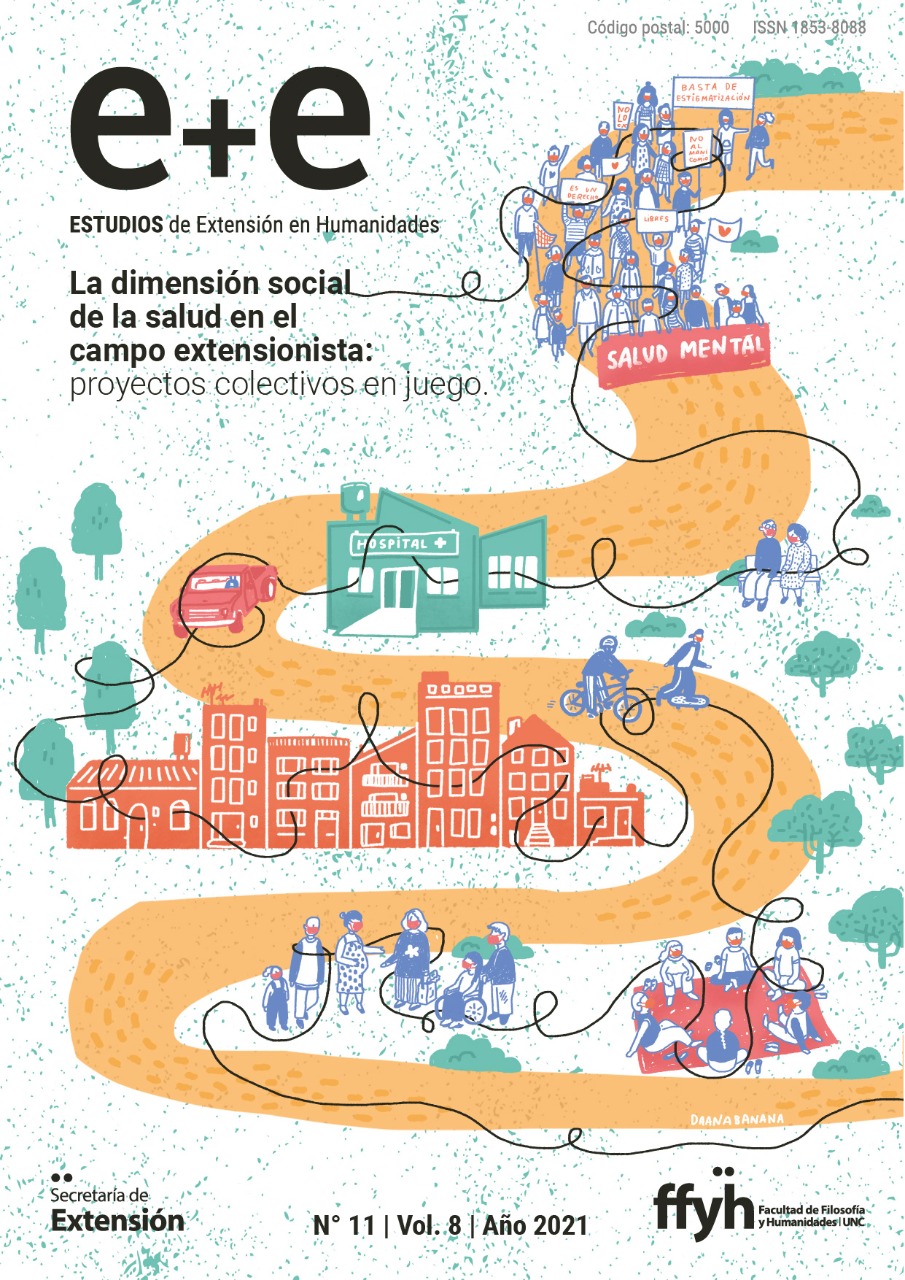
La dimensión social de la salud en el campo extensionista: proyectos colectivos en juego
Vol. 8 No. 11 (2021)The socio-health crisis that we are going through and that crosses us on a daily basis, has extended and (re)placed with force numerous questions about what we understand by health, its scope and links with social and territorial inequalities, the environment, the responsibilities that different social actors have and have over it, the complexities involved in care, the limitations of the political answers cut in biological and individual key, as proposed by the market. In the current context, it is necessary to recognize that the pandemic only expands, increases and/or updates these questions and reflections.
We recognize in recent history, that the social dimension of health was brought into focus in our continent at the end of the 20th century by the
continent at the end of the 20th century by the current known as social medicine or collective health. From the academic field, together with social movements, in particular the labor movement, evidence was built on the unequal distribution of disease in our continent at the end of the 20th century.
the unequal distribution of disease, illnesses and deaths in social groups according to their position in society.
social groups according to the position they occupied in the structure of society. Foucault's studies (1999, p. 357) point out in this sense that medicine is connected with the economy "no longer simply because it is capable of reproducing the labor force, but because it can directly produce wealth, insofar as health represents a desire for some and a luxury for others". As Laurell (1986) points out, the process of "health-illness" in collective terms, expresses the historical and social character of the human biological process; understanding "the social" not as "external articulation", nor as just another dimension, but emphasizing the "social character in itself". From a subjective perspective, Menéndez argues that "diseases, illnesses and damage to health constitute some of the most frequent, recurrent and continuous events [...] that affect the daily life of stratified social groups" (Menéndez, 1994, p.71). These are events that disrupt, fragment and disorganize a large part of the social relations of individuals and groups. Together with the irruption of situations of illness or suffering, social responses are organized, also constituting a series of daily, recurrent and permanent constructions, through which relationships, practices (techniques and ideologies) and meanings are established, some of them expressed as professional intervention projects. The field of health is a field of disputes, the tension between societal projects around the expansion of rights and reduction of inequalities against the expansion of the market and the medicalization of life, is expressed in the political, economic, social and also academic game.
The university space and particularly the outreach experiences are configured as a sounding board and at the same time as potential
resonance box and at the same time potential architects in propitiating critical approaches to the dominant, binary and medicalizing modes of social production. It is considered that the projects that bring together multiple experiences and voices are an expression of a context that fosters silenced, repressed, contained demands, which emerge today, with more strength. The extensionist experiences are inserted in historical institutional matrixes and in many opportunities aim at generating instituting processes and novel practices within an instituted habitus, deconstructing meanings and devices crystallized in the most traditional approaches. The different feminisms that transversalize university life have contributed to generate ruptures in the health field with normalizing, moralizing and stigmatizing models in the populations, contributing to the design of "new bridges" in propositive approaches.
We look at university extension in a broad sense, involved in the most diverse aspects of linkage with society, but from a precise perspective; not as a one-way, unidirectional movement, from a university place with knowledge that "takes" its knowledge to others, lacking such knowledge. Neither do we conceive extension as transferring, preventing, training or communicating in health. Rather, we consider that any extensionist linkage implies an encounter between "knowledges" and "tasks" that can be recognized as different and equivalent, as they occur between diverse social actors, between realities that coexist generating situated and contextualized knowledge.
From this perspective, we invite the community in general and the academic community in particular, to share writings that recover practices, experiences, systematizations, reflecting on topics that address health in the extension field. For this purpose, we propose some possible axes, although not exclusive, from this social prism that is intertwined with the good living of ours people:-The gender and human rights perspective in health approaches: critique of the normalization of bodies;
Visibilization of gender inequalities of workers and users of public services; etc.
-Interculturality in health: dialogue/articulation between traditional medicine and biomedicine,
experiences of intercultural practices.
-Models of care in the community: prevention and accompaniment work in situations of gender violence, integral clinics, etc.
gender violence, integral health clinics, etc.
-Disability as a social construction: participatory processes in the construction of demands for invisible groups, campaigns for
Disability as a social construction: participatory processes in the construction of demands for invisibilized groups, rights campaigns, etc.
Peer-to-peer health promotion devices: training of young people in the prevention of problematic substance use, women's round in the accompaniment of pregnancies, etc.
-Territorial primary care experiences: interdisciplinary and intersectoral approaches,
active participation in project management, community intervention from participatory proposals,
etc.
-Intervention in the context of the health crisis-Covid 19: health workers' care,
care demands in vulnerable communities, communicational constructions around risk populations and prevention practices, maps and cartographies of the pandemic from the perspective of extension work, etc.
-Sexual and (non) reproductive health: counseling experiences, the approach to health promotion with young people, women's meeting places, etc.
-Approaches to problem prevention and health promotion from the life course: childhood, youth, adults,
youth, adults.
- Mental health: demanicomializing processes-subjectivizing experiences; representations and practices with service users, intersectoral work networks, etc.
- Community wefts and spatialities of health: experiences in communities around other ways of conceiving and understanding health.
of conceiving and understanding health, collaborative work and diversity of ancestral and territorial knowledge in health, among others.
territorial knowledge in health, among others. -
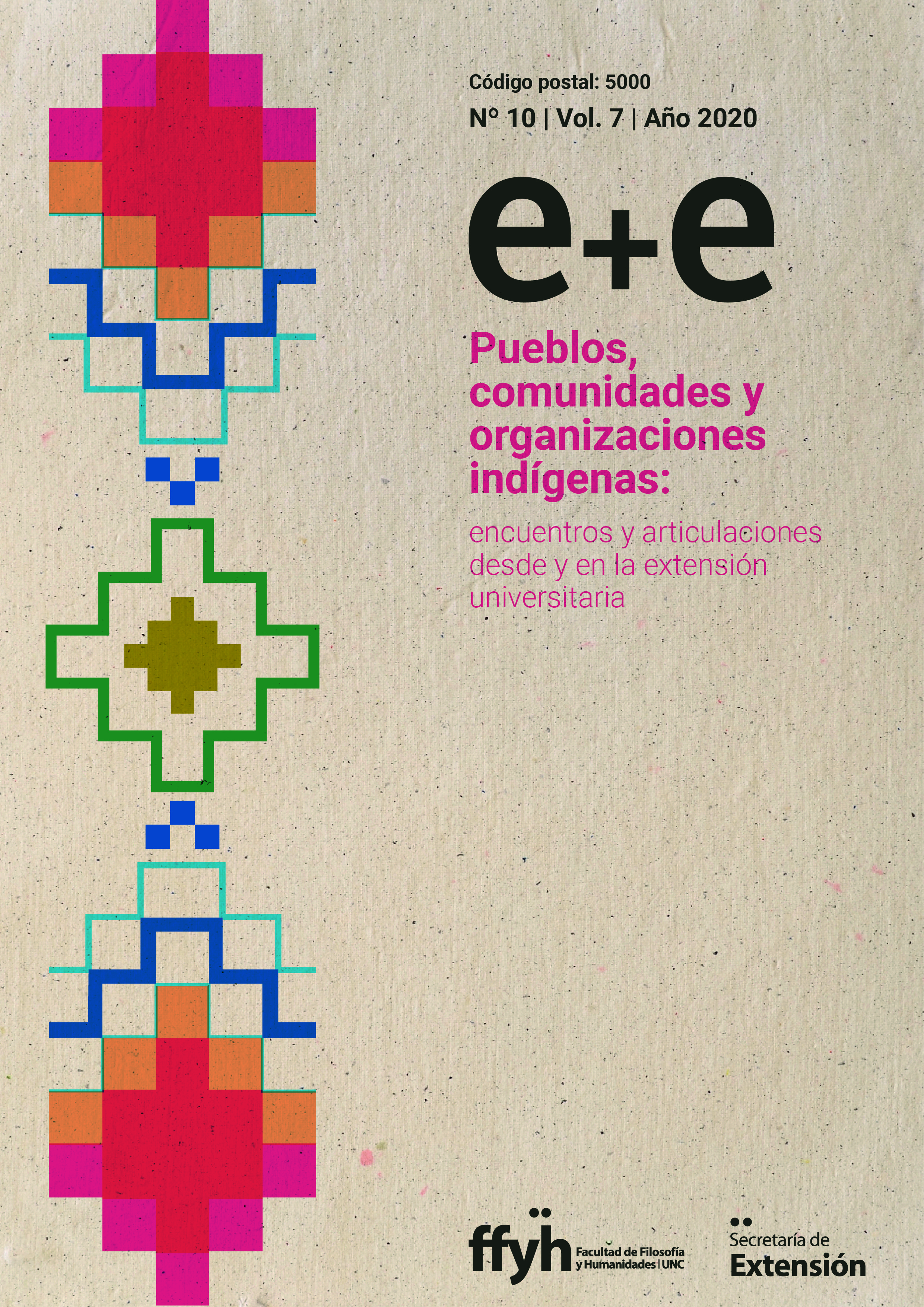
Indigenous peoples, communities and organizations: meetings and articulations from and in the university extension
Vol. 7 No. 10 (2020)The historical relationship between indigenous peoples and the modern/colonial societal project is marked by the structural asymmetry that is evident in the annihilation and extermination of the former in pursuit of the expansion of the latter. In the context of the neoliberal capitalism of the last four decades, such asymmetry has not been modified. We can even affirm that it has worsened, in the way that geographer D. Harvey calls accumulation by dispossession and that translates, in this case, into the advance over the last territories in which these peoples and communities have been confined.
However, although it may be paradoxical, the Argentine State, in the midst of the neoliberal boom and with the constitutional reform of 1994, recognizes some specific rights of indigenous peoples
(article 75, paragraph 17) and proclaims itself a multicultural State, while assuming "the obligation
to repair the damage caused to the original peoples". This whole process at the state level makes sense and must be understood in the framework of global processes such as the International Organization of Labour (ILO) in 1989 and the subsequent Declaration on the Rights of Indigenous Peoples in 2007 to UN level.This process in the state field is the result of the historical resistance of the indigenous peoples and the diverse forms of territorial defense struggle that they have been creating and recreating. In the face of this scene of struggles and resistance, the university has not remained oblivious; on the contrary, it has played and plays very diverse and even antagonistic roles in relation to indigenous causes. It is necessary to to understand and elucidate this ambivalence of the university in view of the central role it plays in the modern/colonial project, as well as the transformation processes within it
operate since the 1918 Reform. In the particular case of university extension, the ways in which
has been conceived and practiced in relation to indigenous peoples and communities, and has oscillated from a paternalistic - and in some cases redeeming - welfare approach, to an intercultural and knowledge dialogue approach in recent times, passing through "inclusive" and "dialoguist" variants typical of neo-liberal multiculturalism. In this sense, and in view of the different positions and their effects, we propose in this dossier to investigate and explore the scope and limitations of extensionist practices in relation to indigenous peoples, communities, and organizations. What are the effective and possible encounters and articulations between university extension and the struggles, demands, and resistances of indigenous peoples? To what extent do our extensionist practices allow for their critical elucidation? What are the interstices that allow for extensionist practices that are unrelated to the modern/colonial hegemonic project? What lessons can we learn in the construction of a dialogue of knowledge? -
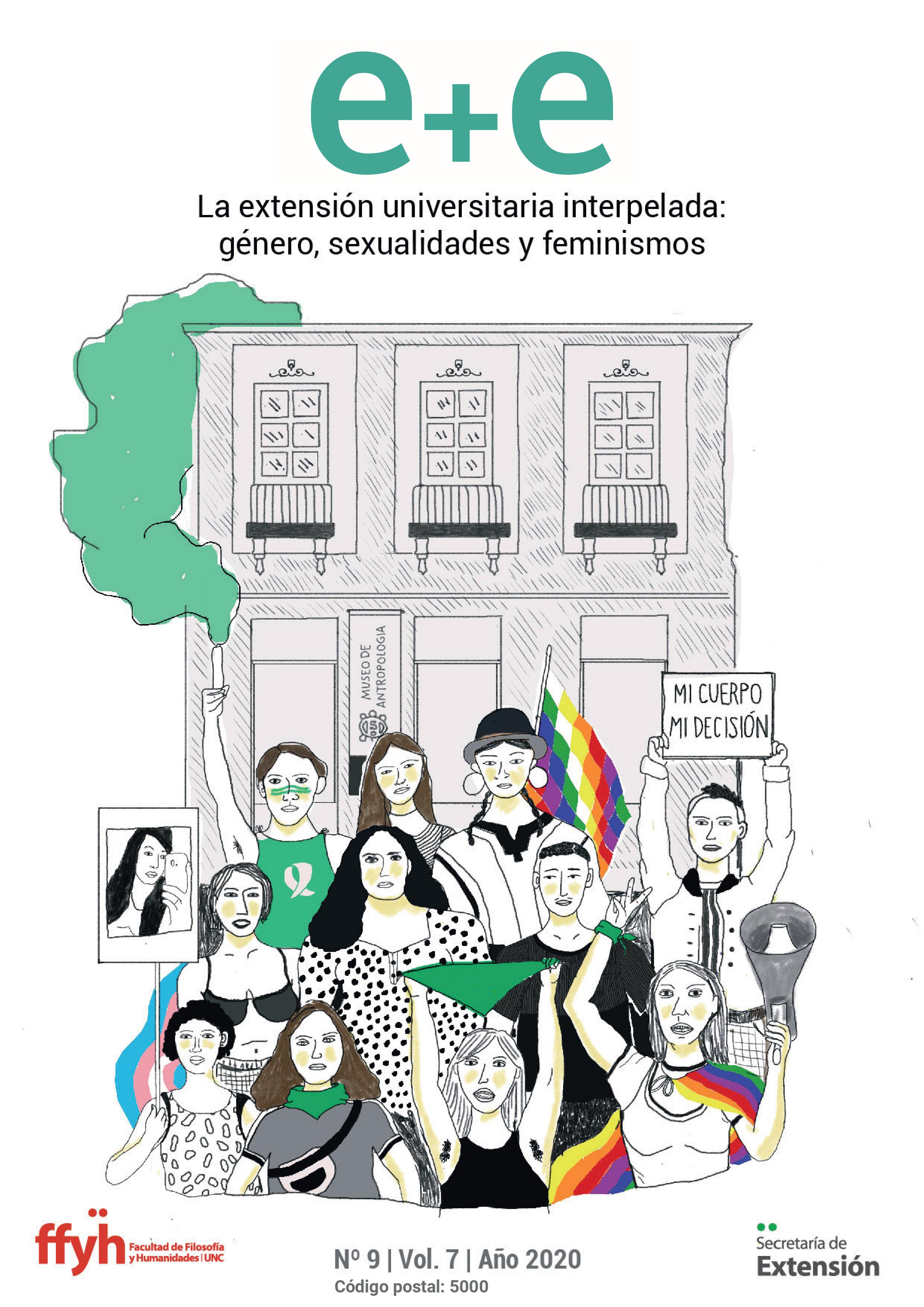
The questioned university extension: gender, sexualities and feminisms
Vol. 7 No. 9 (2020)With regard to the heterogeneous field of gender and sexuality, the current context is strongly defined by an ambivalent condition: on the one hand, we are witnessing in our region a recent and pronounced retraction of human rights in general, and of sexual and (non)reproductive rights in particular; and on the other hand, a promising massification of feminism in various spheres of culture, which as an effect of the phenomenon #NiUnaMenos has been called "Feminist Tide". Within this conflictive framework, the sex-gender imaginaries and regulations that subjectify us are vigorously disputed, and such disputes result in the alteration or reification of the cultural horizons we inhabit.
Such challenges have been deeply received and have had repercussions in various areas of the public university: not only have they had an even greater impact on various research and teaching experiences at the undergraduate and graduate levels, which are already permeated by feminist ideas, but they have also stimulated various extensionist initiatives that assume a gender or sex-dissident perspective as their own.
-
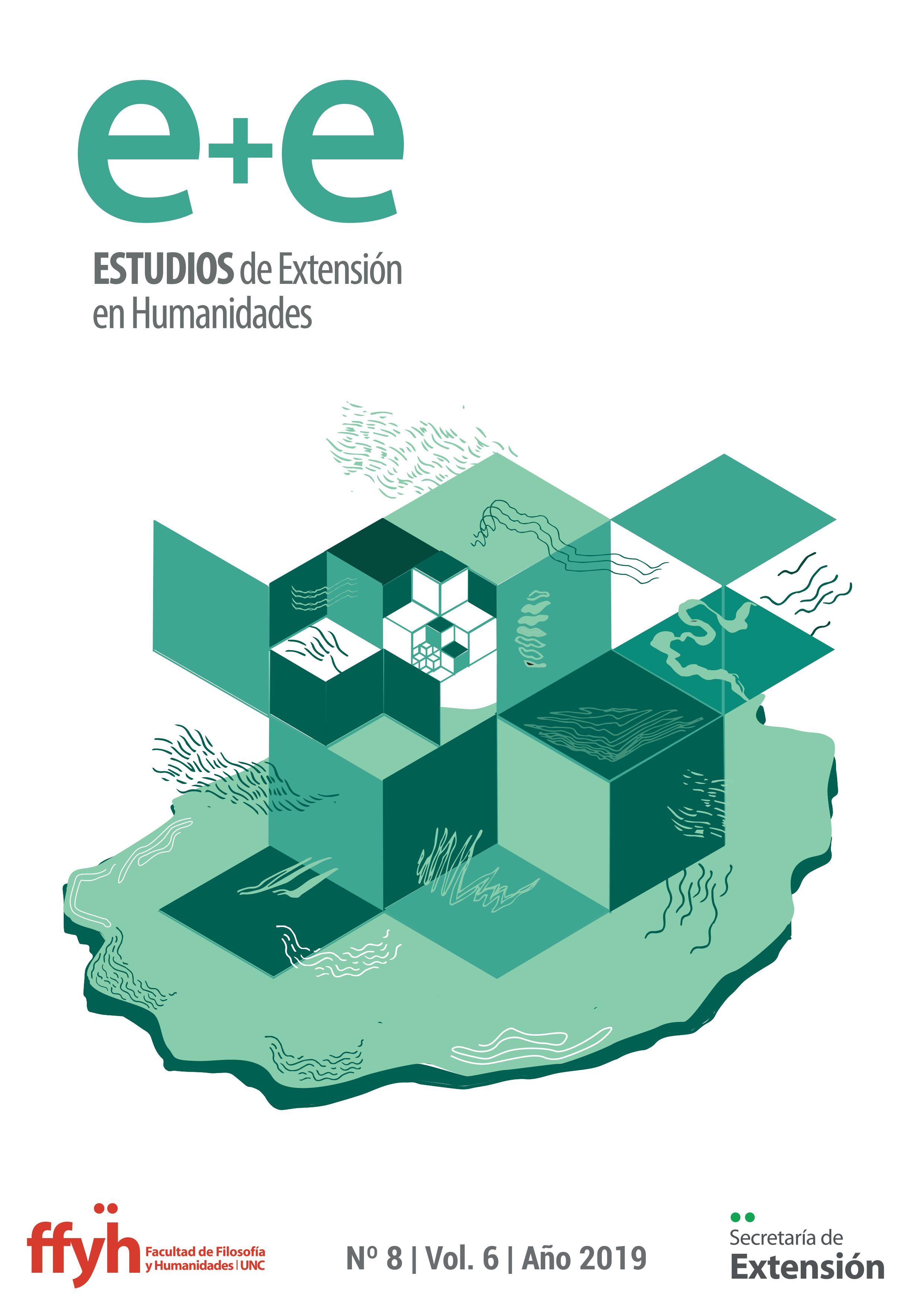
Extensión: un abordaje desde la gestión y las políticas universitarias
Vol. 6 No. 8 (2019)In this edition of E+E we attempt to approach a generally neglected aspect - at least in reflective terms - of extensionist activity. We understand that the management is crossed by several conditions: a first and fundamental characteristic alludes to the fact of being marked by the political processes of the institutions. In this sense, it is affected by various situations that are particularized. To take into consideration only a few we can mention the "times of management", understood in terms of periods or lapses for the exercise of the mandate. This fact, by giving it its end date from the beginning, requires a careful study and prioritization of the tasks to be undertaken, knowing that the years in which this function will be developed will allow only a few projects to be carried out. Simultaneously, the "times of management" can be read from the vertigo of participation in cabinet spaces (faculties, central areas, etc.) strongly crossed by the need for permanent updating of political readings in terms of actors, powers and conflicts that complicate (and compete with) the time that is "dedicated to management".In this sense, we understand that extension, more precisely its management, goes beyond the bureaucratic-administrative contours that undoubtedly cross it and that it is defined as a political doing that has high creative and institutional potentials that need to be thought about.
-
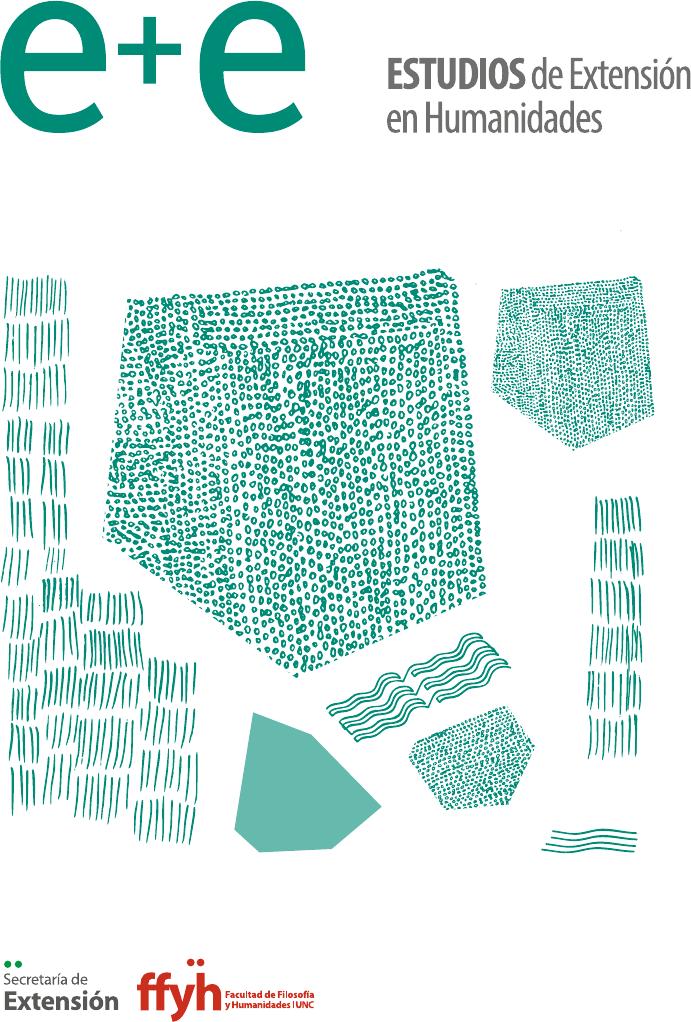
La extensión de la reforma. A cien años del Manifiesto Liminar
Vol. 5 No. 6 (2018)En esta edición la Revista E+E invita a rememorar el aniversario número cien de la Reforma Universitaria de 1918, pero principalmente a realizar una reflexión crítica y situada de las prácticas, experiencias y sentidos que asumen hoy los postulados de ese movimiento revolucionario que transformó la herencia y contenido de la universidad en Córdoba, en nuestro continente y en diversos espacios-tiempos. Consideramos que la actualización de los postulados reformistas implica concebir a la universidad como un espacio en constante transformación, que transciende el acontecimiento histórico de la reforma y de la escritura del Manifiesto Liminar para situarnos aquí y ahora en el presente de la universidad y los sentidos adscriptos a su función y su vinculación con la sociedad más allá del “puertas adentro” del quehacer universitario. Entendemos a la extensión universitaria como espacio potente para reflexionar de forma crítica en tono retrospectivo y prospectivo sobre las líneas fundacionales y fundamentales de aquel proceso histórico, político, social y sus proyecciones presentes. -
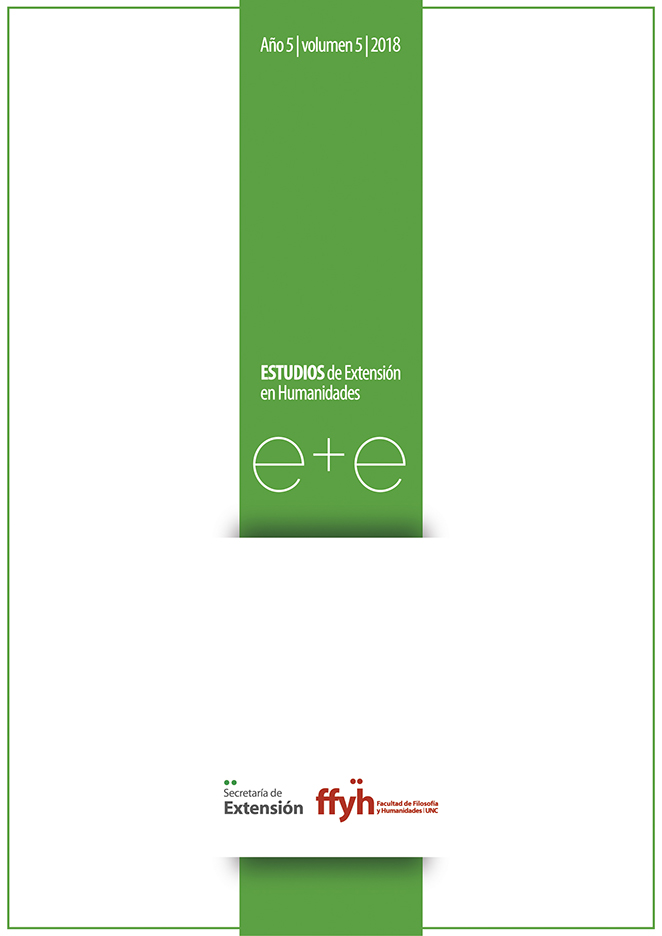
Curricularización de la extensión universitaria. Prácticas y sentidos en disputa
No. 5 (2018)La curricularización de la extensión no resulta un hecho aislado dentro de las derivas extensionistas. Ésta se ve fortalecida por dos políticas convergentes: por un lado, un proceso de integración de las funciones universitarias (enseñanza, extensión e investigación) que se refleja en las decisiones y propuestas institucionales, y por el otro, la jerarquización de la función extensionista (cuyo esfuerzo ha sido sostenido en la última década). En diferentes realidades institucionales de la universidad pública, la curricularización toma formatos atravesados por condicionantes que responden a las culturas de cada espacio académico, pero que comparten una preocupación por pensar las potencialidades de la extensión en la formación de los/as estudiantes universitarios, los aportes que ésta propicia en los/as graduados/as por los/as cuales se trabaja institucionalmente y también los desafíos que supone para la formación de nuestros/as docentes y nodocentes. Desde una perspectiva de diálogo de saberes, las múltiples modalidades que toma la curricularización de la extensión ponen en tensión otros sentidos en torno a la universidad, como las implicancias del carácter público del conocimiento, el perfil de los/as profesionales egresados/as, los modos de producción de conocimiento de las universidades, los dispositivos de formación tradicionales en el aula universitaria, las formas que adquiere el encuentro con los/as otros/as, etc.
